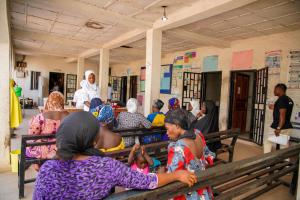Enhancing cervical cancer prevention in Nigeria
Abuja ‒ Adenike Olayemi says Nigeria’s cervical cancer screening programme saved her life: “I cannot imagine what could have happened if I had not done the screening and gone for treatment.”
Olayemi, 43, who lives in Ondo State, was among 667 women who tested positive for the human papillomavirus (HPV) and underwent treatment to avert cervical cancer during a campaign in 2023, funded by the Susan Thompson Buffet Foundation and supported by World Health Organization (WHO) in the African Region.
The support to five states, Anambra, Ondo, Kebbi, Niger and Ekiti, enabled routine cervical cancer secondary prevention services across primary healthcare facilities, benefiting 21 851 women. They underwent visual inspections with acetic acid (VAI), a simple, safe and cost-effective alternative to a pap smear. Using VIA a health worker conducts a visual examination of the cervix to detect precursors of cervical cancer following the application of acetic acid.
Pap smears are effective tools to detect abnormal cells before they progress to cancer, but access to this service is limited, especially for vulnerable women living in remote rural areas.
Ilemobayo Wuraola, a nurse at the family planning clinic at Arakale Health Centre in Akure, in Ondo State, says: “The programme provided by the government and its partners at primary health clinics has enlightened many people about cervical cancer, and brought livesaving services closer to the people.”
In line with the Global Strategy to eliminate cervical cancer by 2030, WHO, Gavi, the Vaccine Alliance and partners, in collaboration with the Government of Nigeria, developed and implemented a multi-pronged prevention strategy to protect the lives of girls and women from the deadly disease. This includes the rollout of a mass HPV vaccination campaign targeting girls aged nine to 14 years to receive a single dose of the vaccine in 16 states.
Between October 2023 and January 2024, 4.95 million girls were vaccinated against HPV.
Cervical cancer is one of the most common cancers among women globally, with HPV responsible for nearly all cases. HPV is a sexually transmitted infection, with nearly every sexually active person at risk of exposure. While many HPV infections clear up naturally, certain strains can lead to cervical, anal, oropharyngeal and other cancers, if left untreated.
Cervical cancer is preventable through the HPV vaccine, while regular screening for precancerous conditions can help early detection to reduce cases and deaths by allowing for timely treatment and effective management.
“We commend the government's efforts to introduce the HPV vaccine and set in motion plans to roll out the second phase of immunization to the remaining 21 states,” says WHO Country Representative in Nigeria, Dr Walter Kazadi Mulombo.
“Let us honour the memory of those lost to HPV-related illnesses by renewing our commitment to vaccination, screening, early diagnosis and treatment,” he adds.
Communication Officer
WHO Regional Office for Africa
Email: ridgardn [at] who.int (ridgardn[at]who[dot]int)
Tel: +254 11 289 0666
Media Relations Officer
WHO Regional Office for Africa
Email: dalalm [at] who.int (dalalm[at]who[dot]int)
Tel: +254 703 245 761 (WhatsApp)
